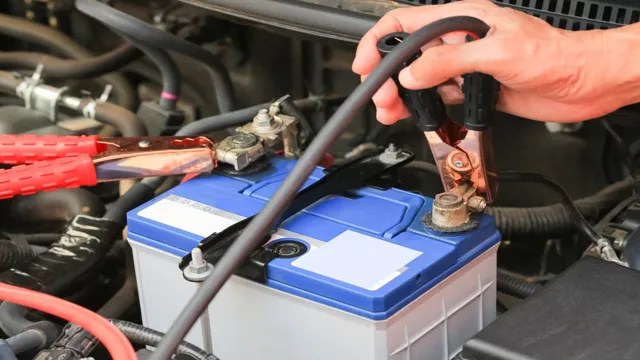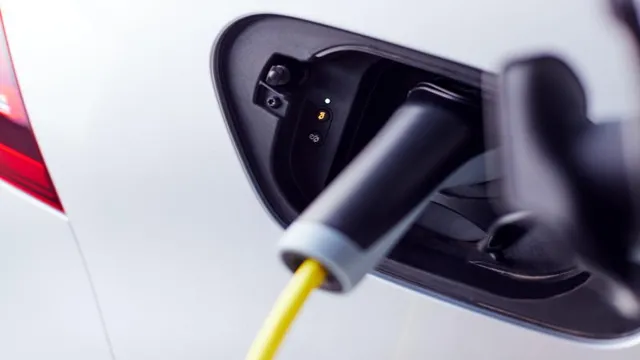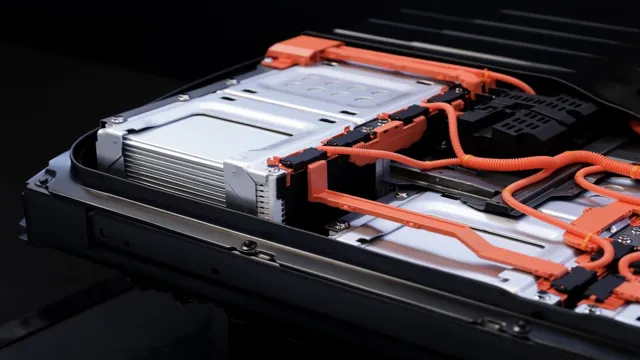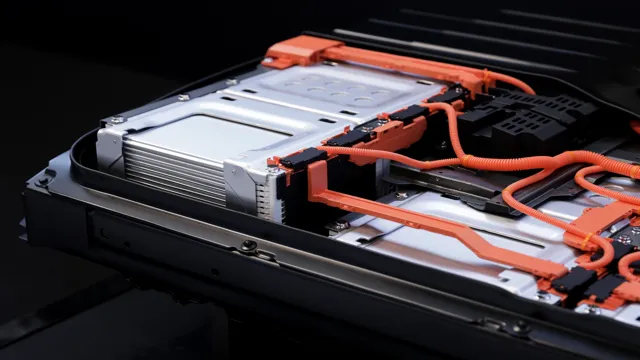Rev Up Your Ride: The Ultimate Guide to Maximizing Your Electric Car Battery Life
Have you ever wondered what the future of cars will look like? With the rise of electric vehicles, it’s clear that a significant shift is occurring in the automotive industry. Electric batteries are powering these innovative cars, and the benefits they offer over traditional gasoline-powered cars are hard to ignore. In this blog, we’ll explore the future of cars with electric batteries, their advantages, and what we can expect in the coming years.
It’s an exciting time to be a car enthusiast, and the future is brighter than ever with the electrification of the automobile. So buckle up and let’s take a ride into the world of electric cars!
Advantages of Choosing an Electric Car
When it comes to choosing a car, many people are now looking towards electric options. This is because electric cars have a number of advantages over their traditional counterparts, especially when it comes to the battery. Firstly, electric cars are much more environmentally friendly as they produce zero emissions, reducing your carbon footprint.
Secondly, electric cars are cheaper to run as the cost of electricity is significantly lower than the cost of petrol or diesel. Additionally, maintenance costs are reduced due to fewer moving parts in the electric car motor and fewer oil changes. Finally, the improved technology in electric car batteries means that they can now last for hundreds of miles without needing to be recharged, making them a practical choice for long journeys.
All in all, choosing an electric car could be a smart choice for both your wallet and the environment.
Cost-saving benefits
One of the biggest reasons to consider an electric car is the cost-saving benefits. Electric cars have the potential to save drivers a significant amount of money on fuel costs. This is because electricity is generally cheaper than gasoline, and electric cars are much more efficient at converting that energy into motion.
Additionally, electric cars require less maintenance than traditional combustion engines, which can save drivers money in the long run. Finally, there are often tax incentives for purchasing electric cars, which can lower the overall cost of ownership. Choosing an electric car can be a smart financial decision, as it saves money on fuel, maintenance, and incentives.
Overall, the advantages of driving an electric car are numerous and should be considered when looking for a new vehicle.
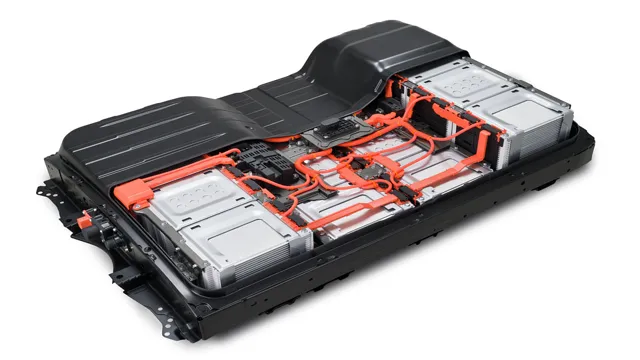
Environmentally-friendly advantages
Electric cars have numerous advantages, with the most significant one being their environmentally friendly nature. Unlike traditional gasoline-powered vehicles, electric cars do not produce harmful emissions that pollute the air we breathe. By using electricity generated from renewable sources such as wind, solar, or hydroelectric power, electric cars help to reduce our carbon footprint.
Another advantage of electric cars is that they are much cheaper to maintain since they have fewer moving parts, making them less prone to breakdowns. There’s no need to change the oil or replace the spark plugs, and the brakes last longer since regenerative braking helps to slow down the car while charging its battery at the same time. Furthermore, electric cars are incredibly quiet and smooth to drive, creating a serene and peaceful experience on the roads.
With more and more manufacturers producing electric cars, the industry is growing rapidly, and it’s safe to say that the future of motoring is electric.
The Technology Behind Electric Car Batteries
When it comes to electric vehicles, the car electric car battery is the heart of the car. The battery converts stored chemical energy into electrical energy to power the car and keep it moving. Unlike conventional gasoline cars, electric cars don’t have an engine, transmission, or fuel tank.
Instead, they’re powered by electric motors and a large battery pack that stores energy. The technology behind electric car batteries has come a long way in recent years, making them more efficient, longer-lasting, and cheaper. These batteries are made up of lithium-ion cells that can be charged and discharged multiple times.
The cells contain a cathode, anode, and separator that work together to store and release energy. As electric vehicles continue to gain popularity, engineers and scientists will continue to improve electric car battery technology to make it more sustainable and accessible for everyday drivers.
Types of electric car batteries
Electric car batteries come in different types, each with its own unique chemistry and design. Lithium-ion (Li-ion) is currently the most popular and widely used type of battery in electric cars due to its high energy density, longer lifespan, and lower maintenance compared to other types. Nickel-metal hydride (NiMH) and lead-acid batteries are also used in some electric vehicles, but they are less efficient and have shorter lifespans.
Solid-state batteries are considered the future of electric car batteries as they offer even higher energy density, faster charging times, and better safety features. However, they are still in the early stages of development and are not yet commercially available. Other types of batteries, such as zinc-air and sodium-ion, are also being researched and developed for use in electric cars.
Ultimately, the type of battery used in an electric car depends on factors such as cost, performance, and environmental impact, among others.
Battery efficiency compared to traditional fuel
When it comes to comparing battery efficiency of electric cars versus traditional fuel, it’s important to understand the technology behind electric car batteries. Electric cars are powered by large lithium-ion batteries, which are charged by plugging them into an electrical outlet or a charging station. These batteries are specifically designed to be highly efficient, with very little energy wasted as heat.
This is because electric cars use the stored energy in the batteries to power a motor, which directly drives the car’s wheels, without the need for any internal combustion engine or transmission. Traditional fuel vehicles, on the other hand, use internal combustion engines that burn gasoline or diesel. This process is much less efficient, with only about 30% of the energy in the fuel being used to actually move the vehicle, with the rest being wasted as heat.
When comparing the battery efficiency of electric cars versus traditional fuel vehicles, it’s clear that electric cars are far more efficient, using nearly all of the energy stored in their batteries to power the car. This means that electric cars are not only cleaner and more eco-friendly, but they also have the potential to be much more cost-effective in the long run, as they require less energy to travel the same distance as traditional fuel vehicles.
How battery charging works
Electric car batteries are charged using a process called regenerative braking, which utilizes the motor to generate electricity. When you apply the brakes while driving an electric car, the wheels spin the motor backward, which generates electricity and sends it back to the battery. This helps to extend the battery’s range and reduce the need for external charging.
However, when the battery does need to be charged, it can be done through a standard household outlet or a dedicated charging station specifically designed for electric vehicles. During the charging process, electricity is transferred from the power source and stored in the battery cells, restoring the battery’s capacity to power the vehicle. It’s important to note that the speed and efficiency of charging can vary depending on factors such as the size of the battery, the charging method, and the temperature outside.
Overall, while electric vehicle batteries may have a different charging process than traditional gasoline vehicles, the technology behind them continues to improve, making them a viable and sustainable transportation option.
Top Electric Cars with the Best Batteries
When it comes to electric cars, the battery is the most crucial part of the vehicle. It determines how far the car can go and how long it will take to recharge. Luckily, as technology advances, so do the batteries that power these cars.
Some electric cars boast batteries with incredible range, allowing drivers to travel hundreds of miles before needing to recharge. The Tesla Model S, for example, has a range of over 400 miles on a single charge. Other electric cars, like the Nissan Leaf, offer more budget-friendly options with a range of around 150 miles.
But it’s not just about range – the efficiency of the battery is just as important. The Porsche Taycan, for example, may only have a range of around 200 miles, but it can charge up to 80% in just 22 minutes using its fast-charging technology. No matter what kind of electric car you’re considering, the battery is the most critical aspect, and it’s essential to weigh the options available to you.
Tesla Model S – longest range electric car
Electric cars are undoubtedly the future of the automotive industry, and as technology advances, so do their batteries and range capabilities. When it comes to electric cars with the longest ranges, the Tesla Model S is the top contender. With a range of up to 402 miles on a single charge, it’s no wonder why the Model S is a favorite among electric car enthusiasts.
But, Tesla isn’t the only company making waves in the electric car market. The Porsche Taycan comes in at a close second with a range of up to 326 miles, followed by the Audi e-tron at 222 miles, and the Chevrolet Bolt with a range of 259 miles. Each of these cars offers impressive batteries and range capabilities, making them a strong contender for those looking to make the switch to sustainable transportation.
With more and more companies investing in electric car technology, it’s exciting to see what the future of electric cars holds.
Nissan Leaf – affordable and efficient
When it comes to electric cars, the battery life is one of the most important factors to consider. The Nissan Leaf stands out as one of the most affordable and efficient options on the market today. With a range of up to 150 miles on a single charge, the Leaf’s battery pack offers reliable performance for daily commuters and urban drivers alike.
The Leaf also features a quick charging system that can bring the battery up to 80% capacity in just 40 minutes. This eco-friendly vehicle boasts impressive fuel efficiency, with an estimated 111 MPGe in city driving and 123 MPGe on the highway. The Leaf is a great choice for those looking to reduce their carbon footprint while saving money on fuel costs.
So, if you’re in the market for an electric car with a reliable battery, the Nissan Leaf is definitely worth considering.
Making the Switch to an Electric Car Battery Today
If you’re considering making the switch to an electric car, you may be wondering about the battery. Electric car batteries are quite different from traditional car batteries, and there are several factors to consider before making the transition. One of the biggest benefits of an electric car battery is that it’s much more energy efficient.
With electric cars, there’s no need for the usual fuel-based combustion engine, which means that you’re consuming less energy overall. This can make a big difference in the long run, both for your wallet and for the environment. Additionally, electric car batteries come with a number of other benefits, such as fewer moving parts and lower maintenance costs.
Of course, there are also some downsides to consider, like the cost of switching to an electric car and the fact that the batteries may not be as long-lasting as traditional car batteries. However, overall, many drivers find that the benefits of an electric car battery far outweigh the drawbacks. If you’re interested in making the switch, it’s a good idea to do some research and find out more about the options available to you.
Conclusion
In conclusion, the car electric car battery is the power source of the future. It provides us with a clean and sustainable solution to the age-old problem of fuel emissions and dependency. With its efficiency and versatility, the electric car battery is poised to revolutionize the way we think about transportation.
So, let’s charge ahead and embrace this new era of eco-friendly driving. Who knows, in the not-too-distant future, the sound of a revving engine may become as outdated as dial-up internet.”
FAQs
What is an electric car?
An electric car is a vehicle that is powered by an electric motor and gets its energy from a rechargeable battery pack.
How does an electric car battery work?
An electric car battery stores energy and powers the vehicle’s electric motor. The battery charges when you plug the car into an electrical outlet.
How long does an electric car battery last?
The lifespan of an electric car battery varies, but most manufacturers offer warranties of at least 8 to 10 years. In practice, depending on usage patterns, an electric car battery can last between 100,000 to 200,000 miles before needing replacement.
How much does it cost to replace an electric car battery?
The cost of replacing an electric car battery depends on the make and model of the vehicle, as well as other factors. Generally, the cost can range from $5,000 to $15,000, but some manufacturers offer cheaper replacement options for older or high-mileage vehicles.
Are electric car batteries recyclable?
Yes, electric car batteries are recyclable. The recycling process involves breaking down the battery and recovering the metals and other materials, which can then be used to make new batteries or other products. Recycling helps reduce waste and environmental impact.


